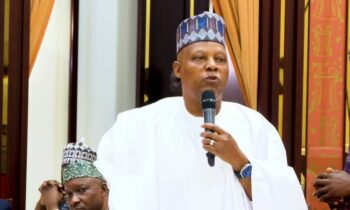
In a way that announces its readiness to reclaim its lost glory, the Financial Reporting Council of Nigeria (FRC) on Thursday bared its fangs, ordering the suspension, withdrawal and restatement of the 2018 financial statement of the Nigerian Maritime Administration and Safety Agency (NIMASA) for non-compliance with financial reporting standards.
The Council which ordered NIMASA to publish the withdrawal of the audited accounts in two national newspapers within seven working days, also suspended the FRC registration number- FRC/2017/CIANG/00000016699 of Bashir Jamoh, its managing director and the certifiers of NIMASA’s 2018 Audited Financial Statement, and Chudi Offodile (Unregistered), rendering the two officials incapable of certifying any financial statements in Nigeria.
“The 2018 Audited Financial Statements of NIMASA are hereby withdrawn, and NIMASA is directed to restate its 2018 audited financial statements. NIMASA is required to publish, within seven (7) working days from the date of this notice, in at least two national newspapers (full page), that their 2018 financial statements and returns have been withdrawn for non-compliance with Financial Reporting Standards.
For violating the financial reporting standards in the preparation of the 2018 financial statement and for its withdrawal, NIMASA is also fined N500 million by the FRC.
“The Council hereby imposes a Type 6 penalty of N500,000,000 for the withdrawal of the 2018 financial statement, in line with Regulation 18 of the FRC Guidelines/Regulations 2014” the management ordered as it emphasizes the commitment of the FRC to upholding financial reporting standards and ensuring the accuracy and reliability of financial statements.
The decision by the Council which is a punishment for NIMASA’s seeming penchant for financial irregularities as financial statements for 2019, 2020, 2021, and 2022 are also affected, is a clear warning that the agency is ready to act and shed the toga of an inert, incompetent and rudderless agency that has become its lot since February 2017 under the former Executive Secretary, late Daniel Asapokhai and the immediate past Executive Secretary, Ahmed Shuaibu who was removed on October 20 this year by the President Bola Tinubu’s administration.
According to Inside Business an online publication, the FRC in a public notice published on the FRC website by its management, the agency said the action is under the FRC Act 2011 (as amended) and the Financial Reporting Council of Nigeria-Guidelines/Regulations for Inspection and Monitoring of Reporting Entities.
The FRC, which has also informed other regulatory agencies of the defective financial statements and returns, has, in addition, notified them of the withdrawal of the financial statement for restatement.
Furthermore, NIMASA is also directed to begin the process of re-stating the 2018 audited account in line with the provisions of the FRC Act and to form the basis for the subsequent years’ account and file it with the Council within two months.
“This restatement will form the basis for the preparation and submission of audited financial statements for the years ended December 31, 2019, 2020, 2021, and 2022. NIMASA is required to file the restated financial statements for 2018, together with the management letters issued by their external auditors, with the Council within 60 days”, stated the management in the public notice.
This action against NIMASA which serves as a warning to all reporting entities of their responsibility to comply with prescribed standards and regulations, is a reminder of October 2015 when StanbicIBTC Bank was ordered by the FRC to withdraw and restate its 2013 and 2014 financial statements for infractions bothering on non-disclosure of material facts.
The then chairman of the bank, Atedo Peterside, alongside the bank’s managing director, Sola David-Borha, other senior officials and KPMG’s Ayo Othinwa were all suspended by the FRC for attesting to “misleading” financial statements.
The council then pointed out several inconsistencies in the bank’s reporting, including IBTC’s failure or refusal to disclose what exactly millions of naira grouped under “donations” and “others” were used for.




